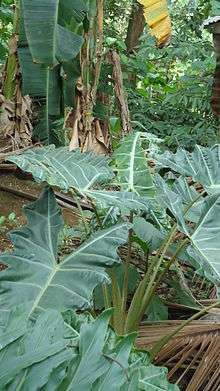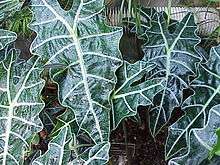Alocasia sanderiana
Alocasia sanderiana, commonly known as the Kris plant, is a plant in the family Araceae. It is endemic to Misamis Occidental and Bukidnon, in the Philippines. It is classified as Critically Endangered by the International Union for Conservation of Nature (IUCN).
| Alocasia sanderiana | |
|---|---|
 | |
| Wild A. sanderiana in Bukidnon, Philippines | |
| Scientific classification | |
| Kingdom: | Plantae |
| Clade: | Tracheophytes |
| Clade: | Angiosperms |
| Clade: | Monocots |
| Order: | Alismatales |
| Family: | Araceae |
| Genus: | Alocasia |
| Species: | A. sanderiana |
| Binomial name | |
| Alocasia sanderiana | |
Description

Alocasia sanderiana is also known as the kris plant because of the resemblance of its leaf edges to the wavy blade of the kalis dagger (also known as kris or keris). It is a tropical perennial with upright shiny, V-shaped and deeply lobed leaves. The plant can be up to 6 ft (2 m) tall and large in its native habitat. However, cultivated specimens are smaller.
It possesses leaves that are evergreen, pelted, V-shaped, deeply lobed, and a glossy deep-green with large silvery white veins. They are about 12–16 in (30–40 cm) long and 6–8 in (15–20 cm) wide, with red-green undersides. The leaf stem is about 2 ft (60 cm) long. The rhizome of Alocasia sanderiana is vertically placed and is known as root stock.
It has creamy-white inflorescences that are about 6 in (15 cm) long, and that are made of a green and white spathe that covers the tiny flowers. Female flowers are grouped at the lower part of the inflorescence, whereas the male flowers are at the top. The fruits are orange-red berries and are not edible.
Uses
A. sanderiana is cultivated as an ornamental plant, for its large dramatic foliage. In non-tropical climates it is used as a house plant. It is also used in making nanomaterials to fight bacteria in vitro.[2]
References
- Medecilo, M.P.; Ong, R.G. & Amoroso, V.B. (2008). "Alocasia sanderiana". The IUCN Red List of Threatened Species. IUCN. 2008: e.T133707A98840843. doi:10.2305/IUCN.UK.2008.RLTS.T133707A3873252.en.
- "Archived copy" (PDF). Archived from the original (PDF) on 2017-08-09. Retrieved 2016-02-12.CS1 maint: archived copy as title (link)
